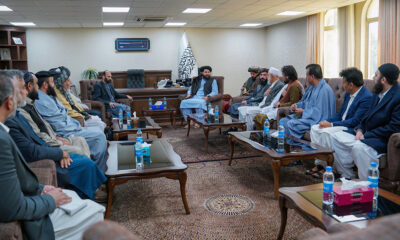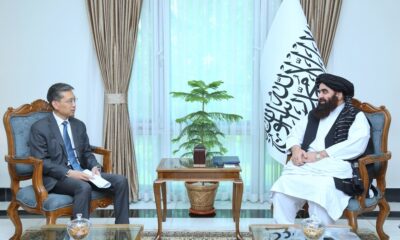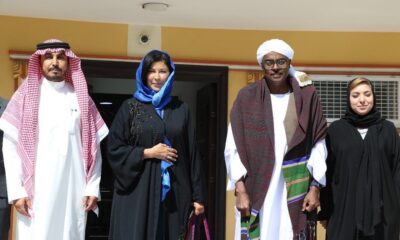Latest News
Acting Interior Minister Haqqani shows face for first time
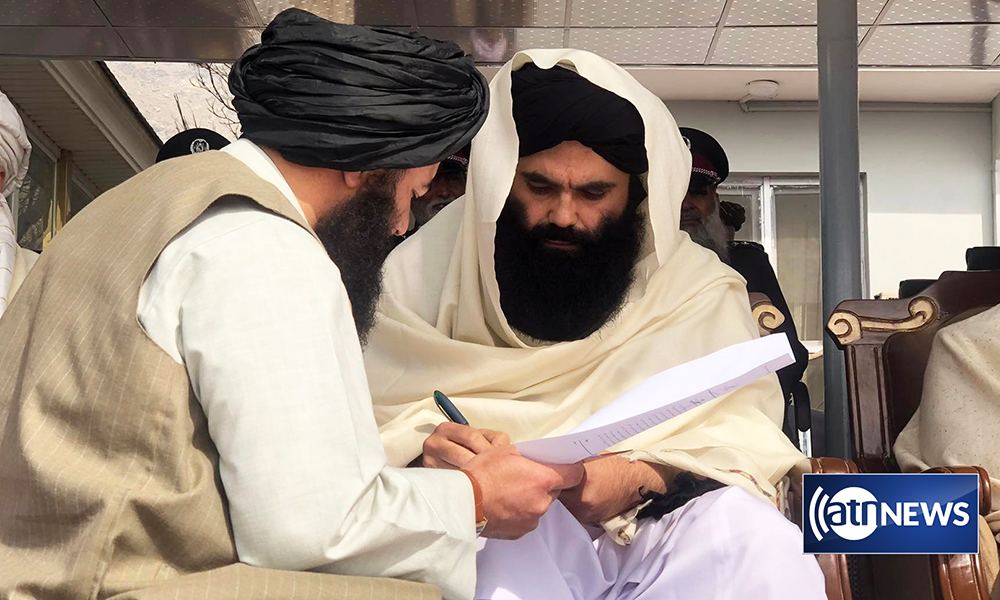
Sirajuddin Haqqani, the acting interior minister of the Islamic Emirate of Afghanistan (IEA) and a longtime leader of the so-called Haqqani network with a US bounty on his head, has appeared in front of the media for the first time.
Haqqani, nicknamed Khalifa, made the rare public appearance during a ceremony that saw the graduation of hundreds of police officers in Kabul on Saturday.
“Since we had not appeared in front of the media, we have now openly appeared in front of the media in order to build trust. Allah Almighty bestowed on us this honor and happiness,” Haqqani said.
In his speech, Haqqani gave serious orders to the security forces over the ongoing house search operation, telling them not to harass people and reach out to the local religious scholars if they encounter any problems during the operation.
“Please be patient and do not harass people during house to house searches and seek help from local clerics in case of any problems,” Haqqani said.
He also said that the IEA was committed to the Doha agreement signed with the United States in 2020 that paved the way to a pullout of US-led international troops that culminated in late August.
Haqqani told the graduating police cadets that the world faces no threat from Afghanistan; and countries that used to spend large sums of money on war in the past can now spend it on the development of Afghanistan.
“We also assure the world that no country will be threatened from Afghanistan’s soil. We protect the lives and property of the people, and it is our responsibility,” Haqqani added.
Haqqani had never allowed himself to be filmed, and an FBI notice of a $10 million bounty on his head for alleged activities featured only a blurry image of a bearded man mostly shrouded by a blanket.
The ceremony was also addressed by Deputy Prime Minister Abdul Salam Hanafi who said IEA was planning to have 350,000 security personnel to ensure security and defend Islamic values and Afghanistan’s territorial integrity.
“The leaders of the Islamic Emirate are committed to building a national and professional police, national and professional army and national and professional security force; we wholeheartedly support all our national facilities,” said Hanafi.
A total of 470 cadets including women graduated from Kabul Police Academy on Saturday.
The force has been trained at the center for four years in the criminal, logistical and border fields, and will be deployed in government departments according to their profession.
Latest News
Russia’s special envoy meets with IEA ministers, discusses bilateral issues
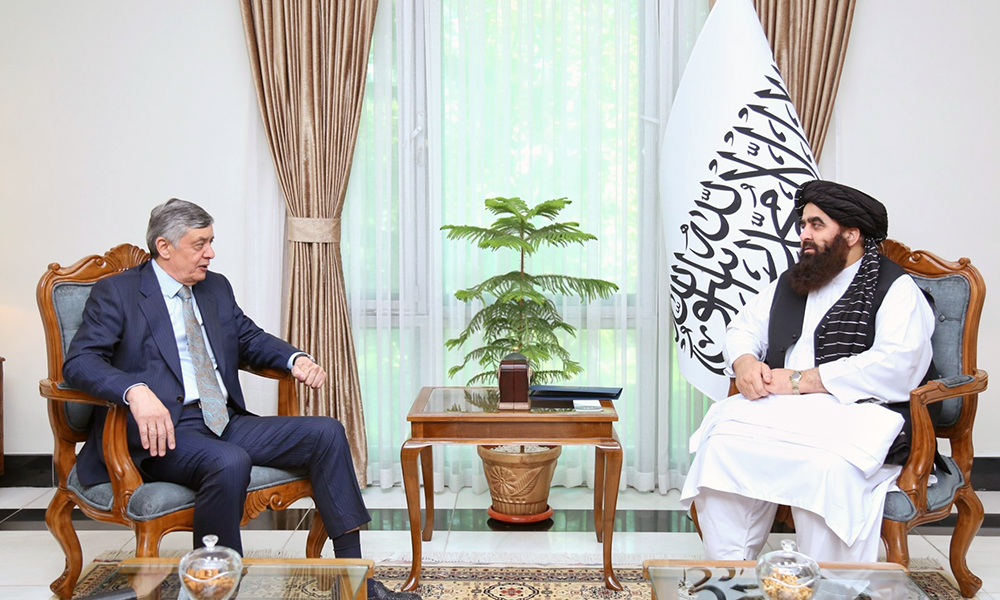
Zamir Kabulov, the Special Representative of the President of the Russian Federation for Afghanistan, who is on a visit to Kabul, has met with the Minister of Foreign Affairs of the Islamic Emirate Mawlavi Amir Khan Muttaqi for talks on political and economic issues between Afghanistan and Russia.
Regional issues were also discussed.
Muttaqi expressed appreciation for Russia’s support at regional and international meetings and emphasized the need to further strengthen political ties and trade relations between the two countries.
He also said that Afghanistan’s relations with countries in the region are flourishing and currently Afghanistan has active embassies in all neighboring countries.
Muttaqi called Afghanistan’s relations with Russia important and said the current ground realities of Afghanistan should be understood and that there is no reason why the United Nations needs to appoint a special representative to deal with Afghanistan.
He said the Afghan government is in talks with the UN over this issue and will make public its position after sufficient clarification has been provided on the agenda and composition of the next UN meeting in Doha.
Kabulov in turn stressed that any meeting held on Afghanistan should be convened with the approval of the Afghan government.
He said it is important for the United Nations to have the Afghan government approve and attend the next Doha meeting.
He said this series of meetings will not yield positive results without the Afghan government being in agreement.
He also said governments of the world should maintain relations with the Afghan government through bilateral mechanisms instead of multilateral contact mechanisms.
Kabulov emphasized that the US should release Afghanistan’s frozen assets and end its unilateral and “illegal” restrictions on the country’s banking system.
He also said Russia and Afghanistan need to improve coordination between them and went on to say he hoped Muttaqi would visit Moscow during the course of this year.
Kabulov also met with acting Minister of Interior Affairs Sirajuddin Haqqani.
This meeting focused on bilateral relations between both countries while political and security issues pertaining to the region were also discussed, the ministry said.
Latest News
Afghans in Europe Union members meet with ministers of defense, mining
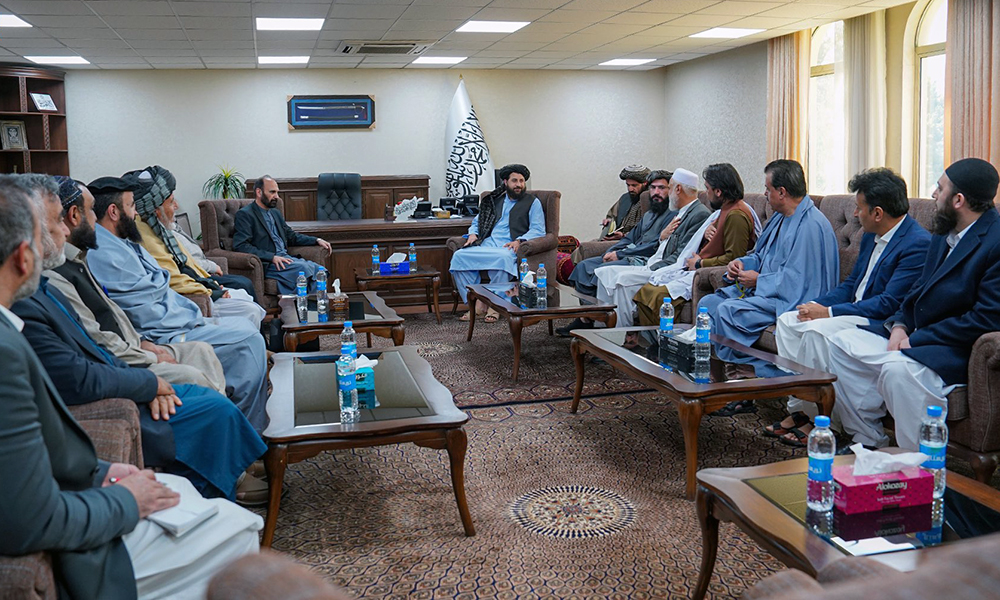
Representatives of the Union of Afghans living in Europe on Tuesday met with the ministers of defense and mining for talks on several issues.
Acting Minister of National Defense Mohammad Yaqoub Mujahid said in a meeting with union delegates that the current security situation in the country has provided an opportunity for everyone to participate in the progress of Afghanistan.
Mujahid added that there were still some problems in certain areas but that these will be removed.
In this meeting, Mujahid called Afghanistan the common home of all Afghans and said the problems in the country will be solved soon.
“The problems that exist in some issues will be solved soon; but there was nothing more than the security that has been revealed in this land today with the help of Allah and with the sacrifices of our people,” he was quoted in a statement as saying.
According to the statement, a number of Afghans, who only moved to the country after the Islamic Emirate’s takeover, expressed their satisfaction with the current situation in the country.
In addition, Shahabuddin Delawar, acting Minister of Mines and Petroleum, also met with union representatives and asked Afghans living abroad to return to Afghanistan and contribute to the country’s progress.
In this meeting, the Afghans living in Europe asked Delawar to provide better facilities to Afghans who want to invest in the country. The Ministry of Mines and Petroleum says that Delawar also asked the visiting delegation to return to Afghanistan and contribute to the country’s development.
Earlier, in a meeting with a number of other officials of the Islamic Emirate, including the political deputy of the Prime Minister and the Acting Minister of Foreign Affairs, this delegation emphasized the need to strengthen the system and provide work and education to Afghan girls and women.
Latest News
Regional developments require Afghanistan, China’s full coordination to protect interests: Muttaqi
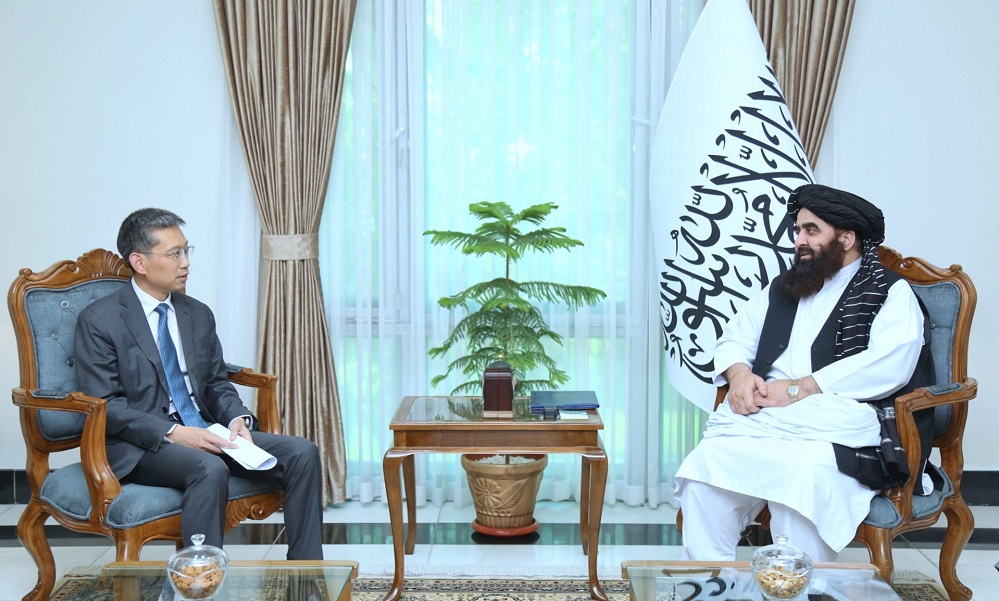
Acting Minister of Foreign Affairs Amir Khan Muttaqi has said that recent events and developments in the region require that Afghanistan and China continue their cooperation in full coordination so that they can protect their common interests.
Muttaqi stated this in a meeting with the Chinese ambassador in Kabul Zhao Xing.
The Ministry of Foreign Affairs said in a statement Tuesday that the two sides discussed bilateral political, economic and cultural cooperation between Afghanistan and China and the recent developments in the region.
Muttaqi expressed his satisfaction with the expansion of political, economic and cultural relations between the two countries and said that the Islamic Emirate has created good opportunities in the field of trade and investment.
He pointed out that the increase in the export of pine nuts to China and the progress in the Mes Aynak and Wakhan Corridor projects are clear examples of this policy of the Islamic Emirate.
According to the Ministry of Foreign Affairs’ statement, the Chinese ambassador considered the developments in various fields with Afghanistan as positive and added that he seeks to encourage Chinese businessmen and investors to play their role for long-term economic cooperation with Afghanistan.
He also said that his country is considering ways of bilateral cooperation and resources regarding Wakhan Corridor.
-

 Business5 days ago
Business5 days agoCommerce ministry inks 10 MoUs to boost development of small and medium-sized businesses
-

 Sport4 days ago
Sport4 days agoRashid Khan threatens BBL pullout after Australia postpones Afghanistan T20I series
-

 Latest News5 days ago
Latest News5 days agoOver 6,000 acres of land cleared of poppies in Badakhshan
-

 Latest News5 days ago
Latest News5 days agoMSF ‘deeply concerned’ over new phase of deportations of Afghans from Pakistan
-

 Sport4 days ago
Sport4 days agoAfghanistan Champions League kicks off with grand opening ceremony
-

 Latest News3 days ago
Latest News3 days agoPakistan’s frontiers minister stresses ‘dignified’ return of Afghan refugees
-

 Regional4 days ago
Regional4 days agoIran’s foreign minister downplays drone attack, says Tehran investigating
-

 Latest News4 days ago
Latest News4 days agoTen people killed by floods in Helmand




